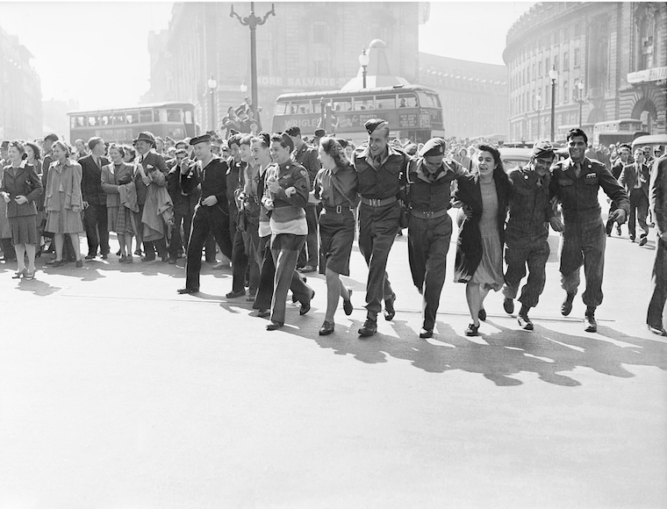In August 1945 my uncle, John Alldridge, wrote this article commemorating the sixth anniversary of the end of World War II for the Manchester Evening News. He ended with the implication that the memory was already beginning to fade. – JF
The end came, officially, in eight words delivered just after midnight in the quiet, precise tones of Mr. Attlee: “The last of our enemies is laid low.”
But after almost six years, it seemed too good to be true.
On the other side of the world they refused to believe it. From Guam, out in the Pacific, came an urgent signal from Admiral Nimitz that Japanese aircraft were still attacking the Allied fleet. And on Luzon an American soldier was shot dead in an ambush – the last Allied casualty of the war.
Then at 5 a.m. the Japanese people learned the astounding, impossible news that they had been defeated. Their Prime Minister tried to find an excuse:
“The war has been lost by the enemy’s use of the new bomb, but Imperial Japan will open a new road in our future.”
Their Minister of War went quietly away and killed himself. For the people of Japan it was to be a day of national mourning. They were ordered, simply, “to cry and deeply apologise to the Emperor” for their failure.
But for the free world it was a holiday.

Civilians and service personnel in London’s Picadilly Circus,
Ministry of Information Photo Division Photographer – Public domain
In Sydney, in Wellington, in every Canadian city, they were out in the streets in a matter of minutes, singing, whistling, dancing.
Crowds milling outside the White House gave President Truman the greatest ovation any American president had had since Lincoln. All along Broadway they were crammed solid.
Later the King, on his way to open Parliament, found himself heading an impromptu victory procession.
In Manchester it was raining. The crowd of 300 or so who had gathered in Albert Square to hear police bell-ringers ring a victory peal took it quietly.
Then they wandered off to celebrate more suitably. But there was a beer shortage and many public houses were closed. Later on, when the numbed shock of it had worn off, the real rejoicings began.
On Blackpool promenade they let off flares and danced round bonfires on the sands. Bolton weavers turned up at the mills as usual, found them closed, and picnicked in the parks instead. Outside Blackburn Town Hall they publicly burnt a Japanese flag captured by a Canadian sergeant.
And in Hulme, Manchester, the first peace baby had already been born. He had arrived one minute after midnight. So they called him Victor.
By midday the Great Ones had gathered their thoughts to do justice to the occasion.
“Perhaps in after years this will be looked upon as a great date in history – a turning point in our blood-stained human story,” said General Smuts.
“Now, we hope, after the cessation of monstrous killing and massacre, that hatred will cease, together with the ambition of domination and oppression of the weak,” said the Pope.
But already there was a noticeable note of uneasiness.
In Buenos Aires there was street fighting between Democrats and pro-Fascists. Two people were killed and 84 injured. Warned Generalissimo Ching Kai-shek: “I urge all our friends in the Allied nations and all my countrymen to face the fact that the peace we have gained by arms is not necessarily the beginning of a permanent peace”.
Asked the Liberal leader in the Indian Congress, Sir Humi Modi: “Will the world have peace and all that makes life worth living? The answer lies with the confounded atom.” We were beginning to realise that, too.
And in Moscow an observer noted that only a few late pedestrians exchanged muted congratulations. “Official celebrations will come later,” said Moscow Radio cryptically.
When did all this happen? On Wednesday, August 15, 1945 – exactly six years ago today: But how many remember the date.
Text:
The British Newspaper Archive (www.britishnewspaperarchive.co.uk)
The British Library Board
© Reach PLC
Jerry F 2022



